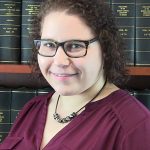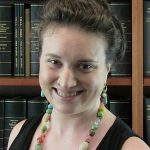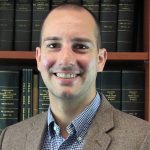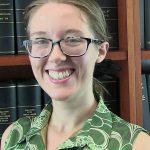The 2017–18 Cohort
The 2017–18 cohort was selected from over a hundred and twenty applicants. They represent eleven different universities from four states. The cohort is diverse in background and experience, but as a whole its members were chosen for their energy, thoughtfulness, and ability to articulate the stakes of larger conversations about careers for humanists and graduate education in the humanities. Proseminar participants are ambassadors for the program, taking ideas and information back to their institutions, representing the initiative at regional and national events, and blogging on this Web site about what they have learned. It is our hope that the proseminar will result in a tool kit of materials that institutions and departments can use to help their graduate students, whatever the students’ chosen career paths.

 Grace Afsari-Mamagani is a PhD student in English and American Literature at NYU with a focus on contemporary narratives of relocation and immigration, digital interfaces for storytelling and pedagogy, and spatial visualization. She is interested in digital experiences that problematize notions of space, emplacement, and embodiment. She received her M.A. in English from NYU and her B.A. in English and Government/Political Science from Dartmouth College. In the past, she has coordinated client campaigns at an agency specializing in community engagement and corporate social responsibility, and supported communications, education, and data management efforts at nonprofit organizations.
Grace Afsari-Mamagani is a PhD student in English and American Literature at NYU with a focus on contemporary narratives of relocation and immigration, digital interfaces for storytelling and pedagogy, and spatial visualization. She is interested in digital experiences that problematize notions of space, emplacement, and embodiment. She received her M.A. in English from NYU and her B.A. in English and Government/Political Science from Dartmouth College. In the past, she has coordinated client campaigns at an agency specializing in community engagement and corporate social responsibility, and supported communications, education, and data management efforts at nonprofit organizations.
 Ella Brians is a doctoral candidate in Comparative Literature at Princeton University. Her work combines a background in philosophy with the study of lyric subjectivity and historical poetics. Her dissertation examines Romantic literary representations of self-formation as a process of self-education. She situates the complex, often contradictory, attitudes of major figures towards formal education, mass literacy and private reading in the context of debates about pedagogy and universal education following the French Revolution. Ella is currently a graduate fellow in Princeton’s Scholars Institute Fellows Program, where she mentors and designs academic and life-skills workshops for first-generation and low-income undergraduates.
Ella Brians is a doctoral candidate in Comparative Literature at Princeton University. Her work combines a background in philosophy with the study of lyric subjectivity and historical poetics. Her dissertation examines Romantic literary representations of self-formation as a process of self-education. She situates the complex, often contradictory, attitudes of major figures towards formal education, mass literacy and private reading in the context of debates about pedagogy and universal education following the French Revolution. Ella is currently a graduate fellow in Princeton’s Scholars Institute Fellows Program, where she mentors and designs academic and life-skills workshops for first-generation and low-income undergraduates.

Candace Cunard is in her final year as a doctoral candidate in English and Comparative Literature at Columbia University. Her dissertation explores how novelists describe and invoke lasting emotional experiences to imbue the rhythms of novel-reading with an ethical charge. In her current position as a core preceptor in Contemporary Civilization, Candace makes space for students to compare their assumptions about texts, traditions, and history against the nuanced, messy reality of the past. She views the humanities classroom as a laboratory for developing practices, thoughts, and desires that not only help students understand their place in a larger world, but encourage them to actively participate in shaping that world.

Brian DeGrazia is a PhD candidate in Italian Studies at New York University, where he also teaches Italian and works as a teaching assistant for NYU’s Core Curriculum. His dissertation examines personal HIV/AIDS narratives in Italian culture from the late 1980s and early 1990s and reconsiders the development of queer theory and biopolitical thought during this period. Brian is an active translator: he is currently working on a critical English edition of Pier Paolo Pasolini’s Corsair Writings, and translates criticism and exhibition materials for Magazzino Italian Art, a private warehouse art space in Cold Spring, New York. He holds an MA in Italian Studies from New York University and an AB in Comparative Literature from Dartmouth College.

Micah Del Rosario is a PhD candidate in English at the University of Pennsylvania. He works on American and British modernism with a focus on the novel, as well as on whiteness studies, affect theory, and neoliberalism and globalization. His dissertation considers how modernist literature by progressive, race-conscious white writers can illuminate the obstacles, pitfalls, and strategies attendant upon white anti-racism today. Micah volunteers as a one-one-one writing mentor for a high-school student in West Philadelphia. This experience regularly reminds him how crucial it is for scholars to develop skill sets for sharing and translating their expertise to aspiring writers and thinkers outside the academy.

Nicole Gervasio is a PhD candidate in English and Comparative Literature with a certificate in women’s, gender and sexuality studies at Columbia University. Her research explores collective trauma, genocide, political violence, human rights, and state repression in contemporary Anglophone, Hispanophone, and Francophone literature from the Global South. She has received Beinecke, Javits, Mellon Mays, and Mellon Interdisciplinary Fellowships. A 2015–16 Public Humanities Fellow at Humanities New York, she is founder of the Kaleidoscope Project, a not-for-profit, diversity-based contemporary literature and creative writing workshop for teens in New York City.

Philip Gleissner is a PhD candidate in Slavic Languages and Literatures at Princeton University. His dissertation analyses mechanisms of cultural consumption and production in the Soviet Union, Czechoslovakia, and the GDR through the lens of literary periodicals. Philip has been involved for several years in the work of the Center for Digital Humanities at Princeton, where he developed the project Soviet Journals Reconnected, which analyzes the social networks that emerged around literary journals in the 1960s. Before his graduate study at Princeton, he received his undergraduate education at Kiel University in Germany, worked in publishing, and taught German at Penn State University.

Silke Graefnitz is a doctoral student with the department of Literatures, Cultures and Languages and the Human Rights Institute at the University of Connecticut. She is currently working on her dissertation about testimonial structures in biographical and autobiographical writings of women writers, focusing on gender, ethnicity and grievability in the face of war and collective violent conflict. Since 2015 she has overseen the Human Rights and Action Learning Community at UConn, and she also teaches German and writing intensive courses on German literature and Human Rights. She has published on intercultural communicative competence and is currently the Vice President of UConn’s Languages Graduate Student Association.

Diana King received her PhD in French and Comparative Literature from Columbia University in 2017. Her research interests include cultural exchanges between China and France, transnational literature, and modern Chinese history. Her dissertation, which she is currently revising into a book, examines how French and Chinese writers interpreted each other’s revolutions during key moments of political crisis and change. She contends that translation served as a key site of knowledge production, shaping the formulation of various political and cultural projects. At the heart of this research is an investigation into how diverse men and women thought about and attempted to create a just world at particularly fraught historical moments.

Pelin Kivrak is a PhD candidate in the department of Comparative Literature at Yale University. Her dissertation examines the relationship of several late twentieth-century novelists and filmmakers from the Near East to the concept of cosmopolitanism. Her broader research and teaching interests include realism and visual culture, literary and cultural theory, modern and contemporary fiction, the intellectual history of the 20th century, comparative film studies, and the study of the novel. In addition to her academic work, Pelin has been part of the creative team at the Museum of Innocence in Istanbul and writes fiction. Her first collection of short stories, There is Possibility in Nothingness, will be released in Istanbul in November 2017.

Srigowri Kumar is a doctoral student in the English department at St. John’s University. She holds a BA in English with minors in psychology and journalism and an MA in English, both from universities in India. Her research interests include postcolonial studies, theories of space/place, and theories of subject formation. Her dissertation is a postcolonial literary intervention in western epistemologies of space. She teaches classes in literature and writing at St. John’s University and Queens College, City University of New York. In the past, her early aspirations for a career in Journalism led her through internships in various capacities with publishing firms and newspaper organizations in India.

Enmanuel Martínez is a PhD candidate in Comparative Literature at Rutgers University, where he is also a 2016–2018 graduate fellow in the PreDoctoral Leadership Development Institute. His dissertation project brings the “archival turn” in the humanities and the professional field of archival science into conversation with decolonial studies to argue for a transnational conceptualization of the archive from the standpoint of colonial and contemporary Caribbean literature and history. He is a recipient of the Ford Foundation Predoctoral Fellowship and has participated in the American Association of Hispanics in Higher Education Graduate Student Fellows Program. Enmanuel holds a BA in Comparative Literature and Latin American and Latino Studies at the University of Pennsylvania.

Kyessa L. Moore is a doctoral candidate in English at Princeton University. She discovered her passion for literature after having received her BS in urban and regional studies from Cornell University and an MA in African American Studies from Columbia University. Kyessa’s dissertation looks at literature, film, and photography of Black female cultural producers to examine how they utilize the senses, literally and as theoretical methods, to create more expansive narratives about the Black female experience. Kyessa seeks to unsettle assumptions about how the works are created and consumed and to reveal a new way of interpreting and analyzing these and other cultural texts, by emphasizing the intractably embodied nature of Black life that weds one to sensory stimuli.

Elissa Myers is a doctoral candidate in English at the Graduate Center, City University of New York, and an adjunct instructor of composition at Queens College. Her primary academic interests are in children’s literature and Victorian and 19th century literature. Her dissertation will examine forms of creative work––in particular, needlework samplers and manuscript and printed periodicals––by nineteenth-century British, American and colonial girls in the context of education. She is working on a digital project aimed at making these geographically dispersed but ubiquitous texts more accessible to a wider range of disciplines and a general audience. Elissa is committed to learning how academics might help address attitudes of racism and misogyny not just in academic work but also through public activism and education.

Daniel Nutters recently earned his PhD in English from Temple University with a specialization in English and American literature from Romanticism through Modernism and critical theory. His work has appeared (or is forthcoming) in the Henry James Review, Journal of Modern Literature, Arizona Quarterly, Symploké, and the American Book Review as well as several edited volumes. He is currently completing two studies: The Humanist Critic: Lionel Trilling and Edward Said and The Man of Imagination: Henry James and Romantic-Modernism.

Patrick Russell is a doctoral candidate in English at the University of Connecticut, where his research focuses on how representations of crime intervene in the American neoliberal state. Patrick has taught first-year writing, tutored for the Texas Tech University Writing Center, worked as the lead tutor for the Texas Tech Health Sciences Online Writing Center, and served as the UConn English Graduate Student Association Professional Development Chair. Patrick holds a BS in Economics. Before turning to English, he spent two years backpacking around the world, and worked in banking and domestic and international logistics. He believes that the habits and skills we learn in academia can translate to satisfying careers outside of academia.

Samantha Sabalis is a postdoctoral teaching fellow at Fordham University, where she received her doctorate in English in 2016. Her dissertation focused on manuals of religious instruction and the development of vernacular literary cultures in 15th century England. She has published articles on medieval hagiography and on incorporating museum education into the composition classroom. In 2016–17, she served as the graduate research assistant and coordinator for “The ‘Living Humanities’ PhD for the 21st Century,” a project to revitalize and reform doctoral education partly funded by an NEH Next Generation PhD Planning Grant. Samantha has served as a docent at the Morgan Library and an intern at the Rubin Museum and the Merchant’s House Museum, and is currently an educator in school programs at the Metropolitan Museum of Art.

Brian Tholl is a PhD student in Italian at Rutgers University, where he specializes in the confino, or the forced peripheral exile of anti-fascists and other “enemies” of Mussolini’s regime. He seeks to examine the ways in which those in exile were able to engage in resistance, and how they conceptualized Italy in their writing and participated in the reconstruction of both the nation and Europe after World War II. He is also interested in the digital humanities and the concept of the “public intellectual,” specifically what it means to be a public intellectual in the fully digital age of the 21st century.

Alicia Williams is a doctoral candidate in English at Rutgers University, where she studies 19th century British literature and the history of reading. Her dissertation traces the transformation of conventions for addressing readers in the periodical and the novel alongside the rise of mass literacy and explores the political implications of these changes through the idea of a literary democracy. An article on George Eliot derived from this project is forthcoming in NOVEL: A Forum on Fiction. While at Rutgers, Alicia has co-organized the 19th century studies graduate student interest group and the English department’s annual Burns Night. Outside of research and writing, she enjoys running, volunteering at the Brooklyn Library, and learning the ways of international K-drama fandom.

Scott Zukowski is completing his PhD in early American literature at Stony Brook University. His dissertation examines the relationship between liberty and identity in 17th and 18th century marginalized peoples, primarily through the lens of newspaper poetry. Scott’s BA and MA are from Tulane University, where public service in post-Katrina New Orleans was not just a priority but an axiomatic civic responsibility. That sense of public service and engagement remains the essence of Scott’s identity as a scholar. He has worked privately as a GIS specialist and is currently creating a database of non-academic organizations that SBU faculty and students will use to identify service learning partners in their own communities.
Connected Academics 2015–16 and 2016–17 Proseminar Cohorts
Click here to see the bios of the 2015–16 and 2016–17 proseminar cohorts.





















